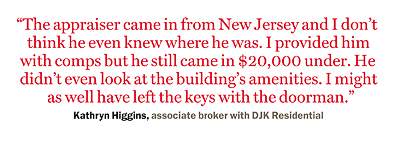
From left: Michael Vargas, a principal with Vanderbilt Appraisal Company, Kathryn Higgins, an associate broker with DJK Residential, and Melissa Cohn, president of Manhattan Mortgage
Late last month, Rep. Gary Miller offered an amendment to the House Financial Services Committee’s “Consumer Financial Protection Act of 2009.” Miller’s amendment — which passed the committee but has yet to be voted on by the House — stipulated that the Home Valuation Code of Conduct would ultimately be sunsetted.
According to one of the California congressman’s aides, Miller’s amendment to the House Financial Services Committee’s act will likely be bundled into a larger financial regulatory reform bill, and Democrats hope to bring the bill to a vote in Congress sometime next month.
For many New York City-based appraisers and brokers, the end of HVCC cannot come quickly enough.
HVCC, which went into effect May 1, requires that a third party with no stake in a sale select appraisers. The code was designed to promote appraiser independence and stop appraisers from inflating the value of a property when it comes to mortgages backed by Fannie Mae and Freddie Mac. Loan officers, mortgage brokers and agents are not allowed to select appraisers under HVCC.
“I think there are some good elements in the code,” Michael Vargas, a principal with Vanderbilt Appraisal Company, said. “What was important to get out there is that applying undue influence on an appraiser is inappropriate. Promoting appraiser independence is very important.”
However, as The Real Deal examined in a story this summer, many New York brokers and appraisers say HVCC has wreaked havoc on the city’s residential real estate landscape because it’s resulted in a great number of lowball appraisals, often determined by appraisers with limited experience in the New York market.
Brokers and appraisers say the situation hasn’t gotten better since then.
“I spoke to a group of real estate agents this morning and over half raised their hands when I asked if they had a sale botched by an out of market appraiser in the past several months,” Jonathan Miller, president of appraisal firm Miller Samuel, said last week. 
The trouble with HVCC, according to brokers and appraisers, is that it’s opened the door to out-of-town appraisers simply because they have offered low bids for a job. As a result, there are scenarios where an appraiser, whose area of expertise is, say, Westchester or Connecticut, comes into Manhattan and submits a low appraisal for an Upper East Side co-op unit.
Kathryn Higgins, an associate broker with DJK Residential, said a carpetbagger appraiser affected a deal she was working on in Battery Park City just last week.
“The appraiser came in from New Jersey and I don’t think he even knew where he was,” she said. “I provided him with comps but he still came in $20,000 under. He didn’t even look at the building’s amenities. I might as well have left the keys with the doorman.”
Higgins continued: “Ultimately, it hurts everyone. The buyers love it, but then the sellers won’t make a deal, and this is after we’ve gotten the sellers to price realistically. Who needs this? It’s not like we’re a bunch of shysters jacking up prices.”
From a national perspective, The Real Deal reported this month that a National Association of Realtors survey found that 86 percent of realtors and appraisers nationwide felt that the quality of appraisals has decreased since the new code took effect.
Vargas the appraiser said that while he has definitely seen instances of inexperienced appraisers submitting lowball numbers on New York properties, popular sentiment may be placing too much blame on HVCC.
“When people’s values are lower, the immediate reaction is to say, maybe the appraisal is wrong,” he said. “It’s very possible that the lower appraisal may be right. There’s been a lot of talk that every instance of a deal gone awry is because of HVCC, but some of it may have to do with values just being lower.”
Nevertheless, Vargas said that the code’s “unintended consequences” mean it should be completely overhauled.
Others in the industry agree.
“Everyone in the industry backs the idea that if HVCC can’t be rescinded, it should at least be revamped in a way that doesn’t hurt the market,” said Melissa Cohn, president of Manhattan Mortgage.